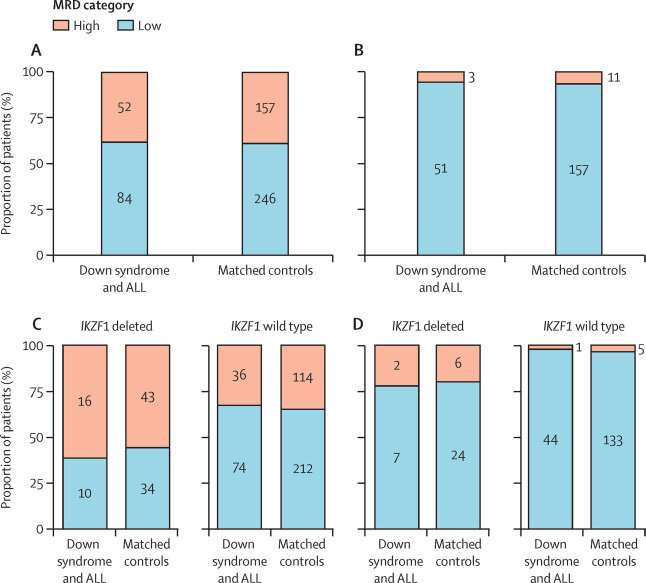High-risk leukemia is more aggressive in children with Down syndrome

Children with Down syndrome have a lower chance of survival from a particular high-risk form of leukemia (ALL) than children without the disability, new research shows. Researcher Naomi Michels in the Den Boer group: "We need to continue the search for targeted therapies and immunotherapy for these children."
Children at higher risk of their cancer recurring usually receive more intensive treatment. But that's not possible for children with Down, as they tend to have more side effects from treatment. The syndrome is a genetic disorder, but the possible effect of DNA changes in leukemia cells in Down was still unknown.
In a new study, scientists from the Princess Máxima Center and the Erasmus Medical Center compared the effect of therapy in leukemia patients with and without Down syndrome. The international study, involving researchers from the United Kingdom, Germany, Scandinavia and Australia, was published today (Tuesday) in Lancet Haematology. In the Netherlands, the study was funded by the Princess Máxima Center Foundation and the Children's Oncological Center Rotterdam Foundation.
Treatment equally effective
To account for differences in known risk factors, data from 136 leukemia patients with Down syndrome were matched with those from 407 children who did not have Down syndrome. The matched 'duos' had the same age, ALL subtype, and blood results at diagnosis. That's how the researchers knew that any differences that remained were linked to Down syndrome.
Their analysis showed that the levels of leukemia cells decreased equally well in both groups of children after the first month of treatment. But the scientists discovered an important difference in longer-term outcome between children with and without Down syndrome in the so-called Ikaros form of ALL.
Increased chance of cancer coming back
A DNA error in the Ikaros gene leads to a more aggressive form of the disease in all children with leukemia. But children who also had Down syndrome had an even worse outcome than children without the disability, the researchers found.
Naomi Michels, Ph.D. student in the Den Boer group, also part of the Oncode Institute, was involved in the study. "The Ikaros gene mainly increases the risk of cancer coming back," she says. "Children with Down syndrome and Ikaros ALL were more likely to see their leukemia return within five years of treatment." This was the case in 37 percent of these children, compared with 13 percent of Ikaros ALL patients who did not have Down syndrome. In other types of ALL, there was no notable difference between children with and without Down syndrome.
Fewer side effects
The researchers believe the difference has to do with an interaction between the genetic changes in Down syndrome and the Ikaros gene. Michels: "We need to continue the search for treatments with fewer side effects—such as targeted therapies and forms of immunotherapy—in order to be able to better treat children with Down syndrome who have this high-risk form of ALL."
More information: Naomi Michels et al, Minimal residual disease, long-term outcome, and IKZF1 deletions in children and adolescents with Down syndrome and acute lymphocytic leukaemia: a matched cohort study, The Lancet Haematology (2021). DOI: 10.1016/S2352-3026(21)00272-6

















